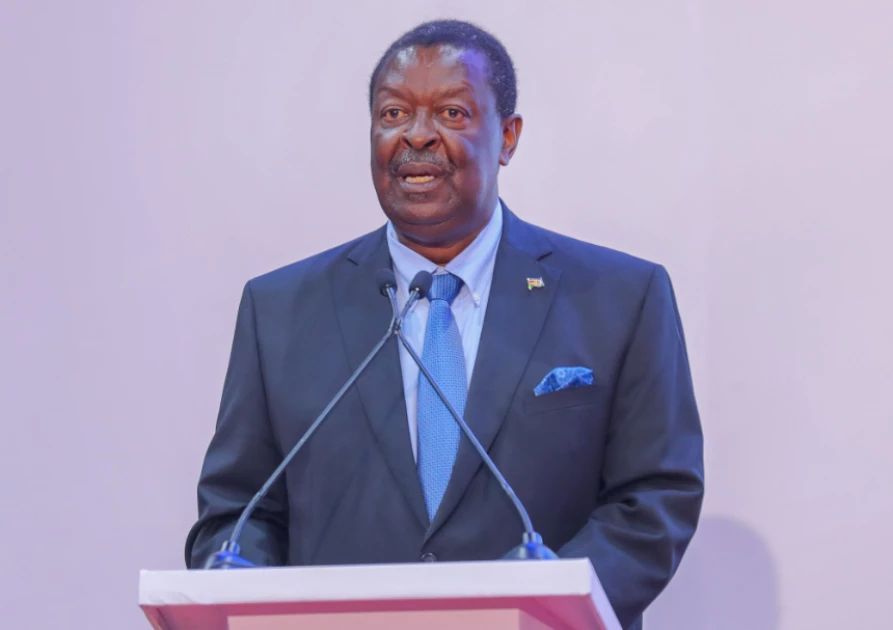Kenya must shift from aid dependency to attracting trade and investment - Mudavadi

Prime Cabinet Secretary and Foreign Affairs CS Musalia Mudavadi speaks at the opening ceremony for 60 years of Kenya’s diplomatic journey celebrations on December 2, 2024. PHOTO | COURTESY

Audio By Vocalize
Kenya should quickly shift gear
from aid dependency to laying the foundation for attracting trade and
investment, Prime Cabinet Secretary Musalia Mudavadi has said.
Speaking in Geneva, Switzerland, Mudavadi
stated that Kenya must adopt and actualize immediate, radical and aggressive
policy shifts strategically focusing on how to generate adequate resources to
fund its critical programs.
Further, he noted that the era
of aid dependency has come to an end and that Kenya and Africa should now be
thinking of quick and sustainable alternative ways to support their economies.
“The geopolitics and shifting
global dynamics being witnessed is a clear indicator that we should be looking
at ways of being self-reliant moving into the future. We cannot afford to
prevaricate. Other countries are making their moves we must make ours now.” he
said.
The Foreign and Diaspora Cabinet
Secretary said this as he concluded his official visit in Geneva, stating that
Kenya’s strategic position as a regional economic and financial hub puts it in
an advantageous position to advance that course.
“Parliament must be quick in
decision making on this agenda, the county governments and the executive must
also be quick and we must embrace a stronger partnership with the private
sector, across board whether in agricultural sector, manufacturing, industry,
finance, technology and many other sectors,” said Mudavadi.
He added that the current
situation calls for critical collaboration, as the world scrambles for the
fewer available investment opportunities and there is no room for making
mistakes.
Mudavadi also cautioned that
countries that have been relying on foreign aid, including donor funding, must
now be wary of the moves being taken by certain countries and capitals,
particularly Washington, and make a solid foundation for their future.
“In the colonial days they used
to say scramble for Africa, where everybody wanted a piece of Africa but now it
is our turn as Africa to scramble for our investments,” said Mudavadi.
Mudavadi, who held several
bilateral and multilateral engagements while in Geneva, particularly pointed
out his meeting with the Executive Director of the Global Fund to Fight AIDS,
Tuberculosis, and Malaria, Peter Sands, as an eye-opener for the African
continent and Kenya.
He echoed Sands’ message that the
global health fund is under threat in terms of resource mobilization capacity,
painting a grim picture of what awaits nations that have largely depended on
aid to support their health programs.
Mudavadi noted that the global fund
raised about USD18 billion in the previous cycle, and according to Sands, they
hoped to maintain that target. However, the changing global dynamics have
forced major contributors like Washington, which was injecting up to a third of
the required resources, to pull out.
“It is essential that we adjust
not only as a country but as Africa and figure out how we are going to deal
with the financing gap that will arise if resources are not going to be flowing
in the health sector,” he said.
“This brings to question the
whole debate we have been having on Universal Health Care, which has been
taken as a joke with some looking at it as a punitive engagement between the
government and the citizens, but here is a situation whereby the government of
Kenya is going to be vindicated.”
Additionally, Mudavadi explained
and urged Kenyans to support the government’s programs and policies, as the
message coming from the international arena is clear that countries must now
take care of their own health programs.
He pointed out that the health
sector is critical to Kenya, emphasizing that the programs will no longer be
underwritten by donors or partners. Therefore, Kenyans must prepare to adopt
ways that will be helpful moving into the future.
“That which was being seen as
maybe not being popular must now be taken more seriously because it was not
about being popular it was about safeguarding the health of the Kenyan people,”
said the Prime CS.
“The Universal Health Care must
now shift from the angle at which it was being seen to now be seen as a serious
lifesaving program for the people of Kenya.”
Mudavadi however, called for a clean-up of some areas within
the implementation framework of the roll-out of the Universal Health Care
program.
He stated that serious financial adjustments must be made,
as bodies like the World Health Organization are uncertain about the
sustainability of their funding, and others like USAID have been wound up.
“There are almost 1.3 million Kenyans who get support from
partners on matters of health particularly in areas like HIV and access to ARVs
but now these are some of the areas that have been targeted in this financial
adjustment that is taking place globally,” Mudavadi said.
“Kenya at least funds 40% of its own resources and 60% has
been funded by the partners but now you can imagine if there is that guillotine
that we are talking about then what happens with these Kenyans who need that
assistance and it is not there.”


Leave a Comment